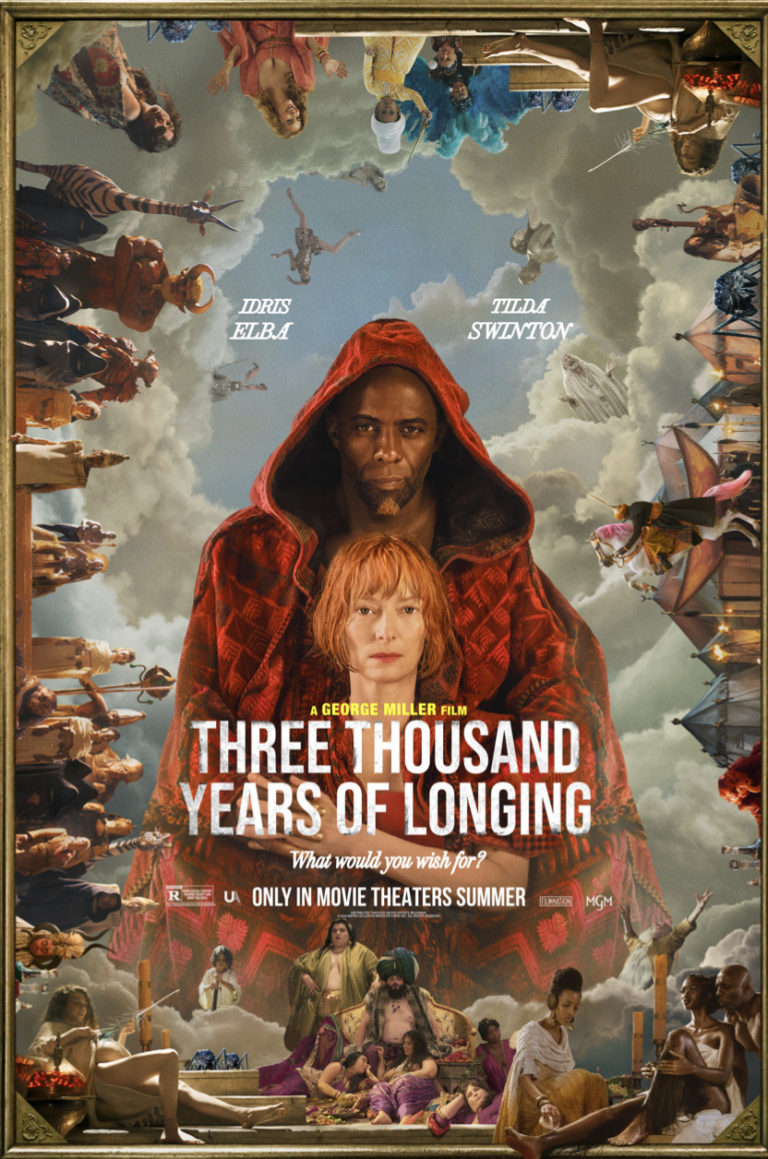
Synopsis : Dr. Alithea Binnie (Tilda Swinton) is an academic — content with life and a creature of reason. While in Istanbul attending a conference, she happens to encounter a Djinn (Idris Elba) who offers her three wishes in exchange for his freedom. This presents two problems. First, she doubts that he is real and second, because she is a scholar of story and mythology, she knows all the cautionary tales of wishes gone wrong. The Djinn pleads his case by telling her fantastical stories of his past. Eventually she is beguiled and makes a wish that surprises them both.
Rating: R (Brief Violence|Some Sexual Content|Graphic Nudity)
Genre: Fantasy, Drama
Original Language: English
Director: George Miller
Producer: Doug Mitchell, George Miller
Writer : George Miller, Augusta Gore
Release Date (Theaters): Aug 26, 2022 Wide
Runtime: 1h 48m
Distributor: United Artists Releasing
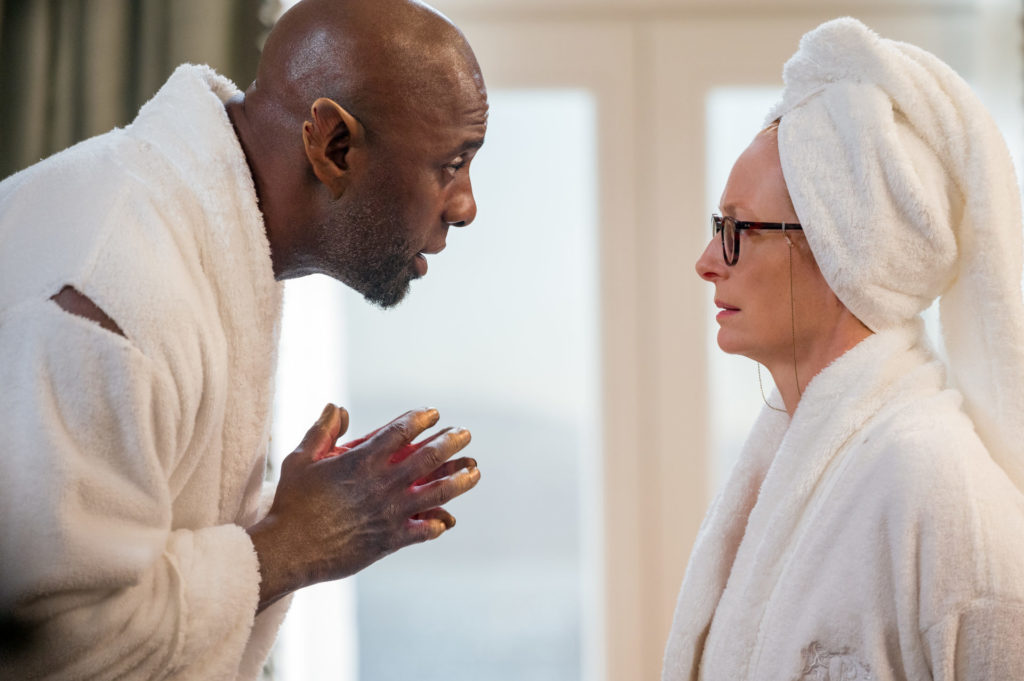
Press Conference with Director George Miller, Actress Tilda Swinton, and Actor Idris Elba
Q: This film is based on a short story by A. S. Byatt. The idea to turn it into a feature has been brewing for a very, very long time. George, what was in the story that you reacted to and why did you want to make this movie so much so that it survived decades of gestation?
George Miller: The simple answer is… It’s a relatively short story. More a novella, about 140 pages, it was loaded with material, most of it paradoxical. Set in a hotel room, it’s a conversation that happens over a relatively short period of time, and yet the content is basically [taking place] across three thousand years. It’s a fairy story, and yet it seems to have a lot of truth in it, which, again, is very, very interesting. You have two characters, one is a scholar, a creature of reason, and the other is a creature of emotion and desire. One is very mortal and the other, can live indefinitely. Ultimately, it’s about stories and what they do to us generally, and in particular, to love. That’s a pretty rich meal in a relatively short story. So that’s on the surface of it. Deeper down, it just is a story. Once read to me at least, I just couldn’t forget it.
Q: You’re talking about those contradictions — very much the definition of a George Miller chamber piece. It also takes place over three thousand years and goes to so many brilliant worlds. At the heart of it is the interaction between these two characters. You’ve chosen two of the most accomplished performers on the planet to pull it off. What was it about Tilda and Idris that made them the right people for this story?
GM: I don’t want to embarrass them speaking about them indirectly [laughs]. To both of you, apart from your skills and talents, in a single word, is your charisma. By charisma, whatever it is, there is that thing, in humans and any creature that we’re intrigued by, is the mystery.
Idris and Tilda both know this story. Until I actually met them in person, I knew them from the movies, television and the work that they’ve both done. I had no idea who they were outside of the characters I’d seen them play. I was lucky enough to meet them both, and Tilda, for a longer period, [since] we happened to be at the same dinner at one time and had a lovely chat.
[I had met] Idris only for a few minutes in London at some event. I’ll speak to [both] of you directly. The moment I met both of you, I was struck by how vivid you were as people, their normal personas. Once that happened, I couldn’t think of anybody else.
We were still working on the screenplay. Lucky enough, sometime later, I sent the screenplay to Tilda first, and she was enthusiastic, and then, the same with Idris. There was no one else for me. The experience of making the film verified that enormously.
Q: Tilda, Alithea is prepared to go on this journey of storytelling with the Djinn. There’s the initial surprise of his emergence from the lamp. But she doesn’t completely freak out. She’s ready to find out about this man, and that speaks to a great curiosity inside of her. What appealed to you about that curiosity?
Tilda Swinton: That’s the right word, curiosity. It’s absolutely right. She’s very self-aware, and when she’s describing herself to the Djinn, she declares very early on at the border, “I am someone who finds feeling through stories.” She is someone who set out her stall for herself in a fairly finite way. “I’m going to be someone who is not going to feel much on my own account, but I find feeling through the stories of other people’s lives.” She also admits or reveals to the Djinn early on that she has a predilection to believe non-rational stuff. She might be a rational individual, but she talks about this early relationship with a boy who was her companion, one might say, an imaginary friend, but someone who really supported her psyche when she was a young person.
She’s very aware that she’s given to this curiosity. It’s literally a dream [laughs] for her to be sitting in this room with a Djinn who’s prepared to tell his stories and provide her with some fantastic snacks. She just sits down and opens her ears and follows. It’s her curiosity. This is an important, emblematic part of her nature — that she’s truly curious.
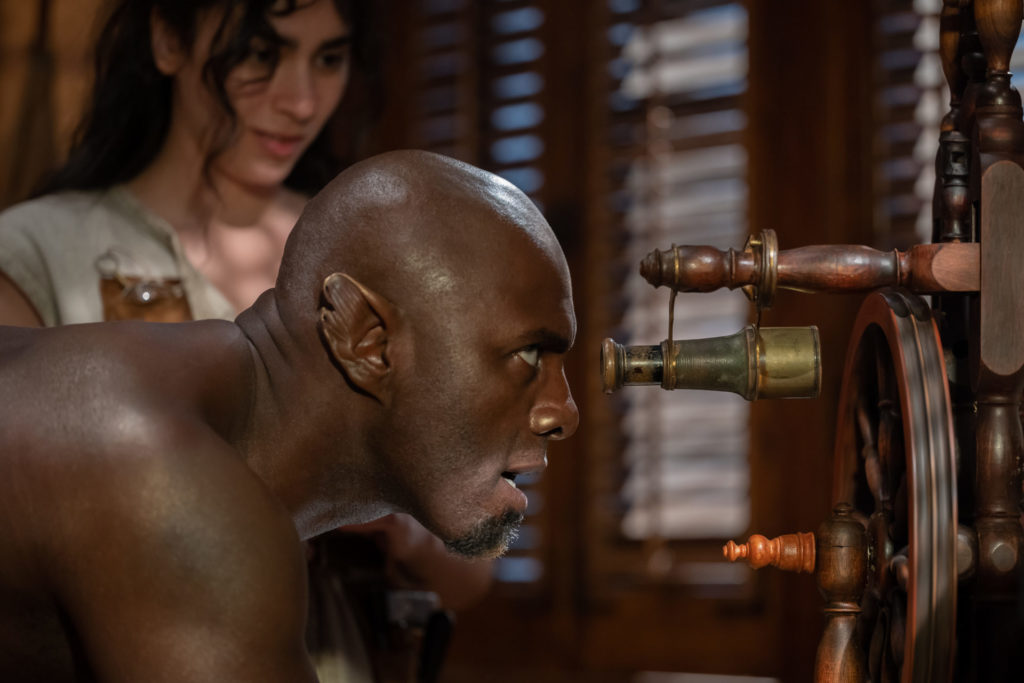
Q: Idris, there’s many stereotypical ideas of what a genie is over the years. What did you make of what George and Augusta had done with this character, who a Djinn is and how did you wrap your head around playing a character like this. One thing that comes across in the film is that the Djinn knows his power.
Idris Elba: George and Augusta’s version of the Djinn was very much, digested, internalized, thought of, and really set out to be unique in the spectrum of the Djinn’s storytelling. That was on the page before I even got there. When we sat around a room for weeks on end, years in fact — two probably — kicking around all of the stuff that George and Augusta had laid down as a foundation, the originality of this character began to spring up and grow. Our collective influence started to build the sort of framework for what became the performance.
It was really important to me to veer away from anything that may have been seen before. This character’s journey is only believable to the audience if we feel we haven’t seen anything like it before. The audience is going to go, “Okay, ha ha, funny story, ha ha, tell me a joke. Do the wish thing. do the magic thing.”
I think you’re engaged in this character to the point where, quite cleverly, George makes you want to ask is he real or not. That’s obviously the device that we end up with at the end of the film. It was really important that we did the work, nurtured the telling of that version of him. As an actor, it was a gift, a complete gift, like, go ahead. There you go, create something.
Q: It was your suggestion that the flashback sequences be shot before the scenes in the hotel. Is that right?
IE: it was [laughs] a bit of a spanner for poor George. He’s like, “Well, we hadn’t figured to do it that way, but it’s a good idea.”
GM: No, Idris, it was a brilliant idea. It was almost the second thing you said to me. You said, “Yes, I’d like to do the movie,” which, of course, made me really happy. And then, “Would you mind if we shot all the stories first, so that when I’m in the hotel room, I have experienced them to some degree, so I can tell Tilda’s character?” And my first thought was, “Damn, why didn’t I think of that myself?”
Secondly, “Boy, I’m working with a real filmmaking actor here,” someone who thinks much more about the film than just his role. That was a memorable moment for me. It was almost the second thing you said [laughs].
Then the third, and I don’t know if you remember this… You happened to be talking in a car on the way to the airport, and you said, “George, I’ve got to get to the airport, but I’ll call you back as soon as I can.”
And then, a couple of hours went by and my phone beeped, and there was a photograph of you and Tilda sitting on the lawn of Tilda’s farm in Scotland, where you were going to DJ at Loch Ness that night. I still don’t know whether you ever met each other before, but what a memorable phone call. Already meeting the person who you’re going to be working with, a bringing together of your intuitions, which really enhanced the film enormously.
TS: It was a brilliant idea, and at the same time, it takes George Miller to [put] that out of in the air and make it happen. It served all of us. It probably served George and the entire crew as well.
GM: Oh, big time. It was the only way to do it. What I can’t believe is that all the time they’d been working on it, I didn’t even think of it. I can’t remember what I was thinking. Anyway, that was one of those moments. But it’s so simple now.
We shot everything during the pandemic, before Christmas break. Then Tilda arrived on the hotel set. By then, we’d cut most of the stories, and so, just before we would shoot the scene, I’d show Tilda what Idris was talking about. That was very, very useful.
Q: Working during the pandemic, there weren’t a huge number of people around. What was that kind of collaboration like when you were all on the hotel set.
TS: As Idris mentioned, we’d already been having this conversation, chewing this cud for years, in fact. We had a very fruitful and enjoyable week in London the year before when Gussie, George and Doug Mitchell came over, and we just threw it all around together, at a big table in a hotel room in London. It was Skype in those days, and now it’s Zoom. We were able to keep the conversation going as if we were in the same room.
When Idris and I both arrived in Sydney after Christmas, you went home for Christmas, and so I arrived for the first time and he arrived for the second time. We were in quarantine in the same hotel, in fact we were in adjoining rooms. We had a big Zoom session every single day. I think our record one day, George, was nine hours of cud-chewing. We just talked and talked and talked through every syllable of the script. All to say that by the time we got onto the set with the camera, we really had seen underneath the surface of the water at the whole iceberg. We really had a sense of confidence, I would say, about the decisions we’d made. And we felt quite settled. Having said that, we still felt free at the last minute to try fresh things. Even though we’d been making decisions for months and coming to choices, we still felt very open and free to bat it back and forwards in different ways through the takes. It was really wonderful that long, long trajectory of just chewing it.
IE: You get to know people when you kick it around. There’s a lot of vulnerabilities that you share with each other. I was, am, a huge fan of Tilda for a long time before we even met. And [now], we’re in a room sitting opposite each other discussing things about acting. You go [makes noise], it’s like being in space and taking your first breath without a helmet. You’re like, is this actually happening? It’s a reciprocal feeling.
Tilda feels equally as welcoming ,open and nervous. Her offering is as pure as it gets, like George is when he’s finally got his actors in the room after writing meticulously each word. Then Tilda will come and say, “I think this and I think that.” All of the vulnerability offers up an experience where you all feel quite safe. As actors, we dread being stale. We want it to be fresh and to feel like it’s the first time you’re saying these words. You can only do that essentially when either, you’re absolutely improvising and don’t know anything you’re about to say or you know the tech so well that you can say it, whisper it, and someone will go with it.
TS: both Idris and I shared with George that we were at the same stage in our work. We wanted to do something different. We both wanted this piece of work to take us into slightly fresh snow, and George was so up for that. He wanted that too. The way you do that is you go around all the corners and put the torch into every single word, under every bit of wainscotting and you just bore yourself with all the old stuff. You can just leap and do something different.
IE: you make up a new language [laughs] .
TS: You make up a new language… with gold ears on top of all of it.
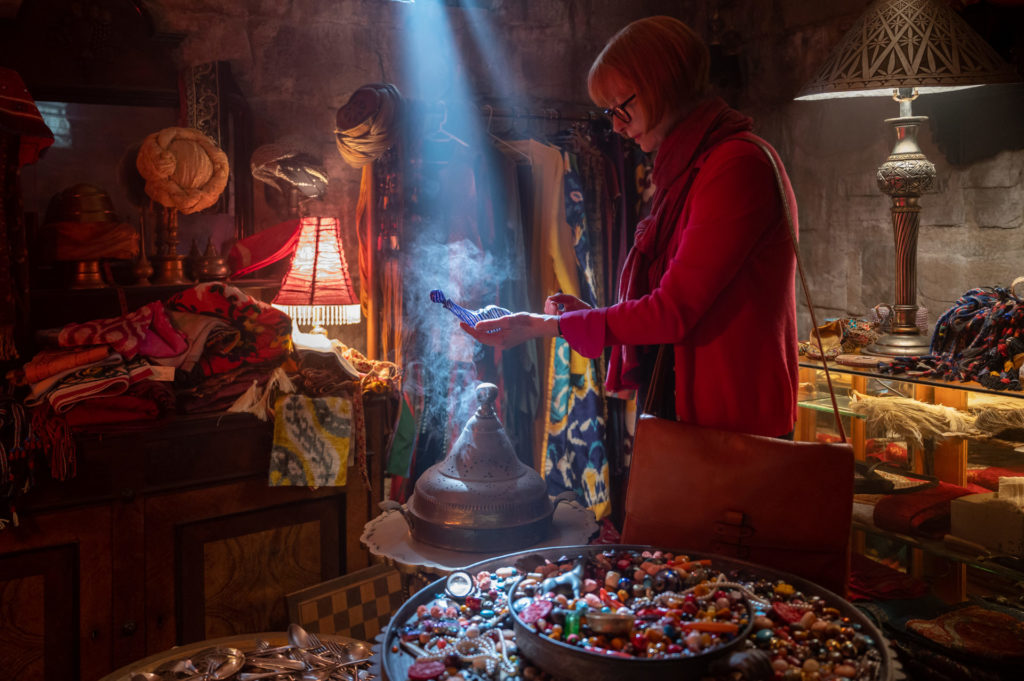
Q: You’ve all been involved previously with films that use mythology and folklore to tell modern stories. Explain how using these types of legends speaks to audiences and how they’re amazing tools for actors and artists?
GM: As I said earlier, one of the paradoxical things of this story is that it asserts itself as a fairytale. What’s really the advantage of, or the benefit of, telling these kinds of stories, or fairytales, is that you’re working with metaphor and symbolism that can be read by each person who happens to be experiencing this according to their own world view and make their own [meaning] of the thing.
At the same time they’re sharing meanings with the collective, it’s what we all do in one way. When the story is open to the interpretation of each audience member, then they’re invited to experience it. I think that’s why we tell stories, and there’s a long tradition of storytelling about animals. It allows you to extract them and take the poetic meaning from them. That certainly was a big attraction in this story and, to be quite frank, all stories. Even the documentaries that somehow stick in my mind are the ones that have that poetic dimension in some way.
There are even [sport] stories or political stories or stories that we think are just normal reporting of events, are the ones that stay somehow and become part of this mythology. And there are those that have a kind of allegorical dimension either deliberately or unconsciously. So that was one of the big gravitational pulls to this story for me.
Q: How do you regard George as a director, and what have you learned about him while making this film?
TS: I was inclined to love George Miller from the first film [of his] that I’d seen. I suppose it was “Babe.” But when I first met him, and I’m both embarrassed and delighted to tell you that when I first met him, I didn’t know that it was George Miller. This extremely nice person I sat opposite at an official lunch in [Cannes] where I was very shy and didn’t really know anybody, and I sat down in front of this very nice-looking person. We started talking, and it was only after about 15 minutes that I realized it was George, who, by that stage, was a great, great idol of mine.
It says a lot that it took me 15 minutes to know that I was sitting with my idol, because he is one of the most loving, communicative, interested, curious people you can ever meet. And I have the privilege to not only know him, call him a colleague, but to say that he’s really my friend. He’s quite extraordinary.
As a filmmaker, he’s truly a master. He really knows cinema and how to work it as a machine in a way that I don’t. My simplest way of saying it is that I was not fortunate enough to live at a time when I could have worked with Hitchcock, but I’ve worked with George Miller. That’s really like, “Move over Alfred Hitchcock,” for me. He absolutely understands cinema and the way to work a camera, to tell a story with it like nobody else. It’s one of the privileges of my life to work with him, and one of the joys of my life to have him as a friend.
GM: I’ve said many times I feel like I’m an inaugural member of the Tilda Swinton director club of which there may be many wonderful directors, and most of them lucky enough to have worked with you several times. There’s a kind of an addiction to working with Tilda Swinton.
Q: Idris, what about for you?
IE: Filmmaking is a series of layers, each layer offering a different sort of perspective on a story, lighting, special effects, acting, sound, coloring. What I learned about George, it’s evident that when he shows up, you’re expecting to see quite marvelous story telling. For each one of those layers, George is an absolute master, including acting. Even though he would say, I don’t know much about acting. And you have to consider that there are a huge amount of layers that can make the image of a film or a scene or a story.
For some, it might be the smallest thing about a special effect artifact that exists only to the director’s eye, and George will be an expert in that. And then to an inflection or a hum or a “hmm” or an eyebrow or a point of view when someone’s listening, George will have a real perspective on that. Obviously seeing his films you know it. But when you watch the man at work — like I have ambitions to direct one day — I told him that it was without doubt going to work with him every day was an absolute masterclass. It was likethe best seat in the best film university you could ever have. It was amazing.
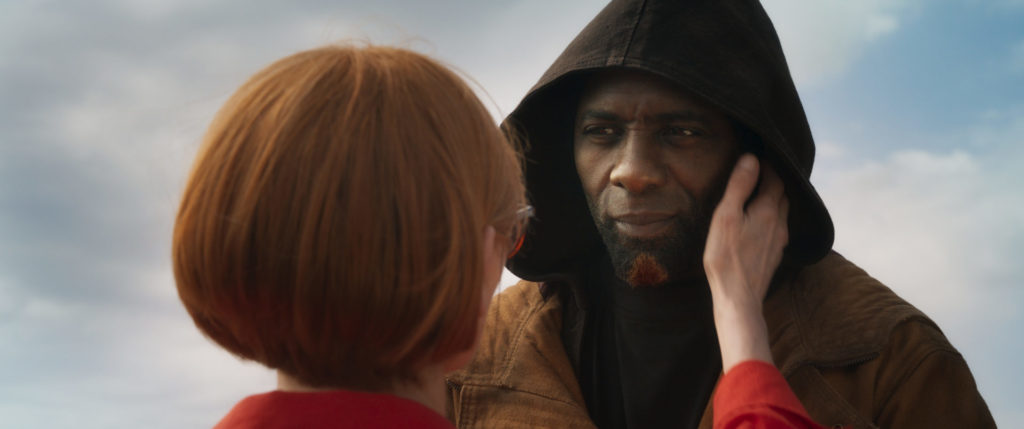
Q: Besides George Miller, what made these roles irresistible to you?
IE: It’s a character I had never attempted or wanted to even try doing. It was controversial in a sense, in the sense that the genie is one thing, Djinn is another thing all together. And to depict Djinn is like sayin’ I’m going to play the devil versus an evil spirit. I’m going for that. As an actor, the challenge is to bring that into life with an entertaining spin but with a certain amount of authority. I know nothing about gins or genies. So that was also quite attractive to me. I got to create an accent that before this film, didn’t exist based on, phonetically, it might sound similar to things you may have heard before, but the work that we did in order to create his voice was really exciting to me. I love how I sound and how… not how I sound, but I love to manipulate how I sound to sound like a different character. So yeah, that’s it.
TS: I can’t escape acknowledging that I’ve had the fun in my life to work with a number of stories about immortals. I have tended to play the immortal. And the great opportunity here was to play the human, was to play the mortal in the face of the immortal. And that was definitely a fresh road for me.
This person, Alithea, is really a departure for me. She’s someone I feel I know, but didn’t necessarily always feel I knew her. I know her now because I’ve seen the film. But she had to be built a little bit, and we all worked together to build her. Because she’s the point of entry; she’s the avatar for the humans in the audience.
That was really an interesting new road for me. I’ve played the supernatural, exotic before but not [with] that point of attachment, and that was really interesting. Again, as Idris says — and this was a similar journey for me as well — it would be quite easy to work a kind of stereotype with Alithea just as it would be easy to work with a stereotype with Djinn.
But an academic of a certain age, a woman who lives by herself, we can immediately see all the dangers. And to negotiate those dangers and work with them and avoid them was the task that we all set for ourselves in relation to Alithea. And to make her someone who is the story is that she has shut herself down to a certain extent.
She has made her decision to live alone, to not have desire, to be intellectual, rational, and above emotion. Yet at that point in her life, to feel herself change. There are all sorts of ways of that being a slightly scary stereotype, and we were aware of that always. But just to try and negotiate that was really an interesting sort of daily workout for all of us.

